Over the past 60 years more than 1,000 alumni and countless faculty, staff and friends have formed the Graduate School of Oceanography community. To celebrate our 60th Anniversary, we will feature 60 stories over the course of 2021 that highlight the breadth and depth of the GSO experience. These stories (along with the thousands that go untold) comprise the story of GSO and pave the way for generations of faculty, staff and students to come. Be sure to visit each week for new additions!
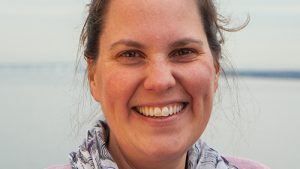 Holly Morin (staff) - Holly Morin, manager of education and outreach for the Inner Space Center was the marine mammal lead and expedition coordinator on the 2019 Northwest Passage Project. "By tracking those species and seeing which animals were where in certain numbers, it’s nice to put all those different puzzle pieces together and get an overall picture of the environment."
Holly Morin (staff) - Holly Morin, manager of education and outreach for the Inner Space Center was the marine mammal lead and expedition coordinator on the 2019 Northwest Passage Project. "By tracking those species and seeing which animals were where in certain numbers, it’s nice to put all those different puzzle pieces together and get an overall picture of the environment." 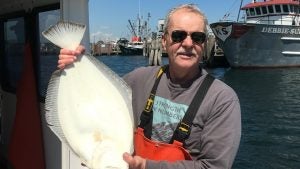 Richard Hittinger (alum) - Rich Hittinger (M.S. 1975) is retired from his business, Alliance Environmental Group, located in Warwick. He has always been an avid fisherman and is presently the acting president of the Rhode Island Saltwater Anglers Association. He believes that "Recreational fishing is very important. It will have a huge impact on the economy,"
Richard Hittinger (alum) - Rich Hittinger (M.S. 1975) is retired from his business, Alliance Environmental Group, located in Warwick. He has always been an avid fisherman and is presently the acting president of the Rhode Island Saltwater Anglers Association. He believes that "Recreational fishing is very important. It will have a huge impact on the economy,"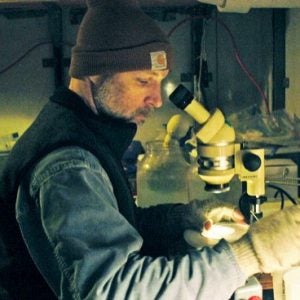 Robert Campbell (alum and marine research scientist) - On the MOSAiC Project, Bob Campbell (Ph.D.1993) was responsible for collecting zooplankton samples and conducting experiments on them. An exciting part of the research was returning to an Arctic ice camp where he repeated measurements he had made 20 years ago.
Robert Campbell (alum and marine research scientist) - On the MOSAiC Project, Bob Campbell (Ph.D.1993) was responsible for collecting zooplankton samples and conducting experiments on them. An exciting part of the research was returning to an Arctic ice camp where he repeated measurements he had made 20 years ago.- Patricia Thibodeau (postdoctoral fellow) - Plankton ecologist Patricia (Tricia) Thibodeau was curious as to why microscopic animals were migrating up to near the surface each night, even in places where the sunlight didn't vary.
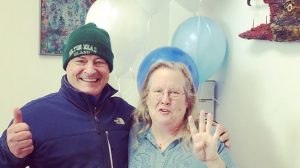 Jane Miner (staff) - As GSO's Business Manager, Jane Miner cheerfully reminds us to submit our time card, but did you also know she was brought up as an environmentalist, is a native Rhode Islander, and has been at GSO for over 4 decades?
Jane Miner (staff) - As GSO's Business Manager, Jane Miner cheerfully reminds us to submit our time card, but did you also know she was brought up as an environmentalist, is a native Rhode Islander, and has been at GSO for over 4 decades?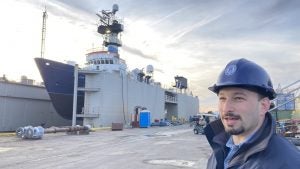 Christopher Armanetti (staff) - Ever since he was a toddler, Chris Armanetti wanted to work on ships. And ever since his time at Massachusetts Maritime Academy he has done just that. After spending several years as a mate, now he is the Master (captain) of the R/V Endeavor and enjoys working with scientists and marine technicians. He makes sure they can carry our their research safely and securely.
Christopher Armanetti (staff) - Ever since he was a toddler, Chris Armanetti wanted to work on ships. And ever since his time at Massachusetts Maritime Academy he has done just that. After spending several years as a mate, now he is the Master (captain) of the R/V Endeavor and enjoys working with scientists and marine technicians. He makes sure they can carry our their research safely and securely.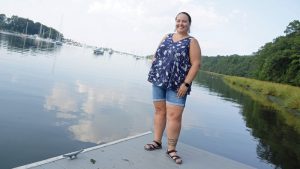 Colleen Peters (alum) - “Having that MBA was really handy because I can now have elevated conversations with my teammates and work out actual business strategy related to equipment and service.” Colleen Peters (M.O. & M.B.A. 2019), who now works at Saildrone, earned her "Blue MBA" which enhanced her existing science background while also giving her the financial and economic know-how to advance her career in a growing commercial industry.
Colleen Peters (alum) - “Having that MBA was really handy because I can now have elevated conversations with my teammates and work out actual business strategy related to equipment and service.” Colleen Peters (M.O. & M.B.A. 2019), who now works at Saildrone, earned her "Blue MBA" which enhanced her existing science background while also giving her the financial and economic know-how to advance her career in a growing commercial industry.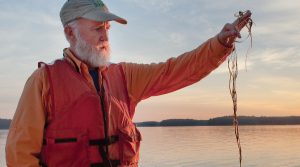 Fred Short (alum) - “Our research has shown that the biggest threat to eelgrass is the excess nitrogen coming from human sources—mainly wastewater treatment plants." Fred Short (M.S. 1976) founded SeagrassNet, the Global Seagrass Monitoring Network which is now used at 139 sites on every continent except Antarctica (where seagrass has yet to be found).
Fred Short (alum) - “Our research has shown that the biggest threat to eelgrass is the excess nitrogen coming from human sources—mainly wastewater treatment plants." Fred Short (M.S. 1976) founded SeagrassNet, the Global Seagrass Monitoring Network which is now used at 139 sites on every continent except Antarctica (where seagrass has yet to be found).- Kathleen Beck (staff) - Kathy Beck has worked at GSO for 23 years. During her time at GSO she has worked for 4 Deans and 3 Interim Deans as the GSO Dean’s Executive Assistant and also worked with 3 Associate Deans. She worked in the Fish Building, helped move the Dean’s office to OSEC and continued on. Read her reflections about her work and the Bay Campus community and learn about her retirement plans.
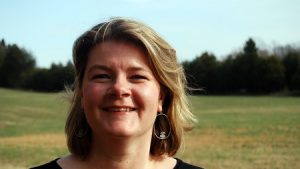 Lora Harris (alum) - Lora Harris (Ph.D. 2006) did research to use chemicals of human origin, like artificial sweeteners and soaps as "fingerprints" to help determine if discharge from septic tank systems are polluting nearby watersheds. "In combination with isotopic tracers, this could help differentiate wastewater from agricultural sources, which would be useful” said Harris.
Lora Harris (alum) - Lora Harris (Ph.D. 2006) did research to use chemicals of human origin, like artificial sweeteners and soaps as "fingerprints" to help determine if discharge from septic tank systems are polluting nearby watersheds. "In combination with isotopic tracers, this could help differentiate wastewater from agricultural sources, which would be useful” said Harris.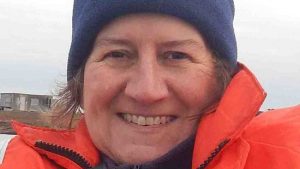 Carin Ashjin (alum) - Woods Hole Institution oceanographer Carin Ashjin (Ph.D.1991) spent 4.5 months in the Arctic as part of the MOSAiC expedition and then returned to a pandemic altered world. “I reflect on how what I thought would be surreal (working on a ship frozen into the ice in the middle of the Arctic Ocean) is now normal, and the world that I left behind is the one that is surreal".
Carin Ashjin (alum) - Woods Hole Institution oceanographer Carin Ashjin (Ph.D.1991) spent 4.5 months in the Arctic as part of the MOSAiC expedition and then returned to a pandemic altered world. “I reflect on how what I thought would be surreal (working on a ship frozen into the ice in the middle of the Arctic Ocean) is now normal, and the world that I left behind is the one that is surreal".- Christopher Reddy (alum) - Chris Reddy, (Ph.D. 1998), offers his perspective on the Indian Ocean oil spill. Chris says" I'm a scientist who has studied oil spills all over the world for more than three decades, including the Deepwater Horizon disaster in 2010. I've learned that the way an oil spill unfolds is not always simple or straightforward, and the worst-case scenario isn't a fait accompli."
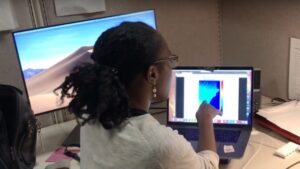 Yackar Mauzole (alum) - Yackar Mauzole (M.S. 2014, Ph.D. 2017), discusses what being an oceanographer is like during COVID times, conducting research from your laptop. Growing up in Paris, France she thought "I’d likely become a scientist, as I love solving problems and challenging my mind." Now she is an oceanographer specializing in satellite oceanography and ocean fronts.
Yackar Mauzole (alum) - Yackar Mauzole (M.S. 2014, Ph.D. 2017), discusses what being an oceanographer is like during COVID times, conducting research from your laptop. Growing up in Paris, France she thought "I’d likely become a scientist, as I love solving problems and challenging my mind." Now she is an oceanographer specializing in satellite oceanography and ocean fronts.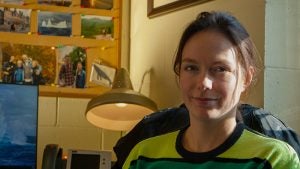 Veronique Oldham (faculty) - This professor studies how elements cycle in the ocean. “I’m especially interested in looking at small-scale, nitty-gritty reactions and applying them to larger scale problems and questions,” says Vero. Recently, she spoke with The Garden about keeping our oceans “breathing” during an era of unprecedented carbon emission.
Veronique Oldham (faculty) - This professor studies how elements cycle in the ocean. “I’m especially interested in looking at small-scale, nitty-gritty reactions and applying them to larger scale problems and questions,” says Vero. Recently, she spoke with The Garden about keeping our oceans “breathing” during an era of unprecedented carbon emission.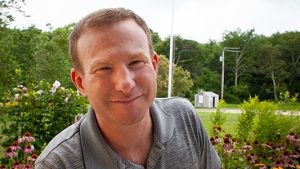 Adam Soule (faculty) - A professor of marine geology and geophysics, Soule is the Ocean Exploration Cooperative Institute’s new director. “It’s been my privilege to go to the seafloor in a submersible and see things no one has seen before,” says Soule. Adam was chief scientist for deep submergence at the Woods Hole Oceanographic Institution.
Adam Soule (faculty) - A professor of marine geology and geophysics, Soule is the Ocean Exploration Cooperative Institute’s new director. “It’s been my privilege to go to the seafloor in a submersible and see things no one has seen before,” says Soule. Adam was chief scientist for deep submergence at the Woods Hole Oceanographic Institution.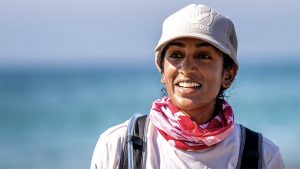 Anupa Asokan (alum) - Asokan (M.O./M.B.A. 2012) is a marine scientist and activist who believes the future holds better outcomes for the planet. From Florida, to Washington, D.C to California, Anupa can be found speaking to the policies and issues of marine conservation. With her dual-degree, Anupa is a leader in science communication and ocean advocacy.
Anupa Asokan (alum) - Asokan (M.O./M.B.A. 2012) is a marine scientist and activist who believes the future holds better outcomes for the planet. From Florida, to Washington, D.C to California, Anupa can be found speaking to the policies and issues of marine conservation. With her dual-degree, Anupa is a leader in science communication and ocean advocacy.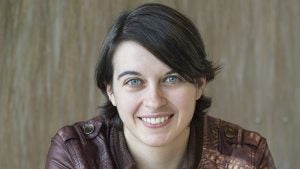 Carrie McDonough (alum) - As a student at GSO, McDonough (Ph.D. 2017) founded Oceanbites, a blog to demystify ocean science by using everyday language. As an assistant professor at Stony Brook University, Carrie is striving to protect the public from exposure to harmful pollutants and draw attention to the global ubiquity of organic contaminants.
Carrie McDonough (alum) - As a student at GSO, McDonough (Ph.D. 2017) founded Oceanbites, a blog to demystify ocean science by using everyday language. As an assistant professor at Stony Brook University, Carrie is striving to protect the public from exposure to harmful pollutants and draw attention to the global ubiquity of organic contaminants.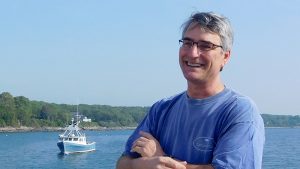 David C. Smith (faculty) - A professor and researcher in microbial oceanography, Smith was selected by AGU to join the first cohort of fellows in its LANDInG Academy—recognition for being a campus leader and a champion for diversity, equity and inclusion in the geosciences. David came to GSO in 1997 and now serves as Associate Dean for Academic Affairs.
David C. Smith (faculty) - A professor and researcher in microbial oceanography, Smith was selected by AGU to join the first cohort of fellows in its LANDInG Academy—recognition for being a campus leader and a champion for diversity, equity and inclusion in the geosciences. David came to GSO in 1997 and now serves as Associate Dean for Academic Affairs.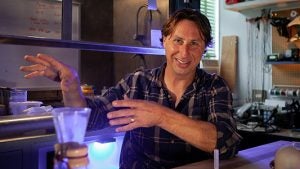 Brennan Phillips (alum) - Phillips (Ph.D. 2016), now an assistant professor in URI's Department of Ocean Engineering, wants to push the limits of technology by creating robotics for ocean exploration that are smaller, lighter and more affordable. He recently developed a miniature deep-sea camera system and the world's smallest fiber-optic reel system.
Brennan Phillips (alum) - Phillips (Ph.D. 2016), now an assistant professor in URI's Department of Ocean Engineering, wants to push the limits of technology by creating robotics for ocean exploration that are smaller, lighter and more affordable. He recently developed a miniature deep-sea camera system and the world's smallest fiber-optic reel system. 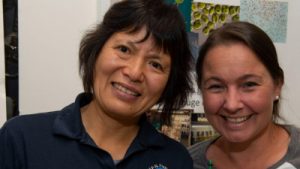 Judy Yaqin Li (alum) - Judy Yaqin Li May (Ph.D. 1996) is a research ecologist at the NOAA Fisheries Milford Laboratory and will be retiring after 16 years of federal service. Judy’s research examines the variability in coastal environments over time and how this variability affects the phytoplankton at the base of the food web.
Judy Yaqin Li (alum) - Judy Yaqin Li May (Ph.D. 1996) is a research ecologist at the NOAA Fisheries Milford Laboratory and will be retiring after 16 years of federal service. Judy’s research examines the variability in coastal environments over time and how this variability affects the phytoplankton at the base of the food web.- Isaac Ginis (faculty) - “We’re also seeing that hurricanes are intensifying more rapidly, going from a category 1 to a category 3 or 4 within a day or two. And that’s a big concern for forecasters who want to issue hurricane warnings in advance of landfall.” Hurricane forecasting models are getting better at predicting hurricanes, thanks largely to professor Isaac Ginis's work.
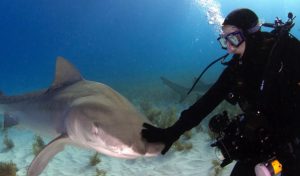 Lauren Romeiro (alum & student) - "Her mission...is to protect sharks from their primary predator — humans." Lauren Romeiro (M.O. 2017) is a marine scientist and well-respected photographer & cinematographer focusing on the conservation of sharks in the Northwest Atlantic.
Lauren Romeiro (alum & student) - "Her mission...is to protect sharks from their primary predator — humans." Lauren Romeiro (M.O. 2017) is a marine scientist and well-respected photographer & cinematographer focusing on the conservation of sharks in the Northwest Atlantic.
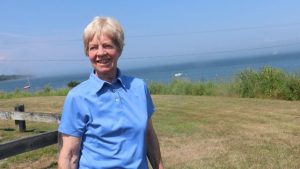 Candace Oviatt (alum and faculty) - “She keeps working hard, she keeps calculating primary production, she keeps writing and publishing papers, and she keeps mentoring graduate students and summer interns.”
Meet GSO alum (Ph.D. 1967) and professor Candace Oviatt, a member of the first class of GSO students, who’s recognized worldwide as an expert on Narragansett Bay.
Candace Oviatt (alum and faculty) - “She keeps working hard, she keeps calculating primary production, she keeps writing and publishing papers, and she keeps mentoring graduate students and summer interns.”
Meet GSO alum (Ph.D. 1967) and professor Candace Oviatt, a member of the first class of GSO students, who’s recognized worldwide as an expert on Narragansett Bay.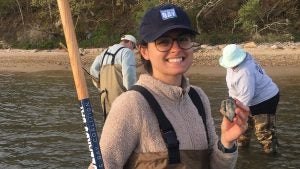 Nina Santos (alum) - “I want to make sure that policymakers know what science has to offer so they can try to make better and informed decisions for the environment.”
Nina Santos (M.S. 2020), who recently started her doctorate in ecological sciences, wants to explore the connections between science and policy.
Nina Santos (alum) - “I want to make sure that policymakers know what science has to offer so they can try to make better and informed decisions for the environment.”
Nina Santos (M.S. 2020), who recently started her doctorate in ecological sciences, wants to explore the connections between science and policy.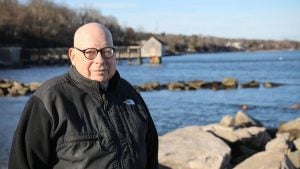 Ken Sherman (alum) - “In 1984, together with professor Lewis Alexander from the University of Rhode Island, Sherman came up with the concept of ‘large marine ecosystems.’”
Ken Sherman (M.S. 1959) retired from NOAA Fisheries in 2019 after 60 years of service, and received many career honors for his contributions to fisheries science.
Ken Sherman (alum) - “In 1984, together with professor Lewis Alexander from the University of Rhode Island, Sherman came up with the concept of ‘large marine ecosystems.’”
Ken Sherman (M.S. 1959) retired from NOAA Fisheries in 2019 after 60 years of service, and received many career honors for his contributions to fisheries science. 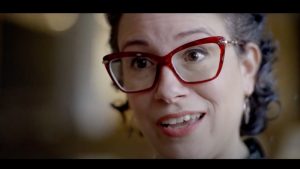 Sunshine Menezes (alum) - “The fundamental passion for me is facilitating equitable access to scientific information.”
Sunshine Menezes (Ph.D. 2005) is the Executive Director of the Metcalf Institute
and frequently lectures and conducts workshops about the importance of equitable science communication, working with the news media, and how to become a more effective and inclusive science communicator.
Sunshine Menezes (alum) - “The fundamental passion for me is facilitating equitable access to scientific information.”
Sunshine Menezes (Ph.D. 2005) is the Executive Director of the Metcalf Institute
and frequently lectures and conducts workshops about the importance of equitable science communication, working with the news media, and how to become a more effective and inclusive science communicator. 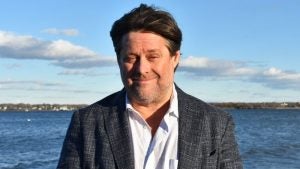 Steven D’Hondt (faculty) - “Steve’s work into the unexplored world is fundamentally collaborative. The more he can work with other scientists investigating similar themes, the more it will inform his research, and the more he’ll learn. And that, for Steve, is the ultimate goal.” Professor Steven D’Hondt is a geomicrobiologist whose work explores the fundamental limits to life on Earth.
Steven D’Hondt (faculty) - “Steve’s work into the unexplored world is fundamentally collaborative. The more he can work with other scientists investigating similar themes, the more it will inform his research, and the more he’ll learn. And that, for Steve, is the ultimate goal.” Professor Steven D’Hondt is a geomicrobiologist whose work explores the fundamental limits to life on Earth.- Joyce Downey (staff) - "One of my favorite things is putting together a display of books and articles in honor of a GSO person who has retired or passed away, to highlight his or her work." Joyce Downey, Coordinator of Library Services, has assisted countless students, faculty and staff at GSO's Pell Marine Science Library for over 21 years.
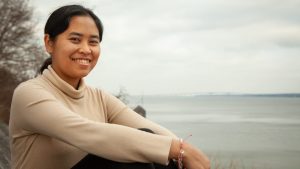 Berta Borneo (alum) - “With my new degree I hope to build my career, get involved in more research and, if possible, propose my own research interests so I can ascend to a higher level.” Berta Borneo is the first international student to earn a Master of Oceanography (M.O.) degree from GSO and now works with the Ministry of Marine Affairs and Fisheries in Indonesia.
Berta Borneo (alum) - “With my new degree I hope to build my career, get involved in more research and, if possible, propose my own research interests so I can ascend to a higher level.” Berta Borneo is the first international student to earn a Master of Oceanography (M.O.) degree from GSO and now works with the Ministry of Marine Affairs and Fisheries in Indonesia.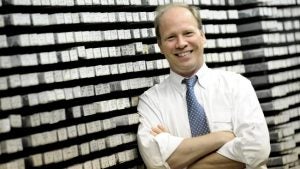 Peter de Menocal (alum) - “I think the biggest challenge—not for me, really, but for oceanography—is finding our path forward to use our knowledge to make a difference in the world.” In 2020, Peter de Menocal (M.S. 1986) was selected as the Woods Hole Oceanographic Institution’s new President & Director.
Peter de Menocal (alum) - “I think the biggest challenge—not for me, really, but for oceanography—is finding our path forward to use our knowledge to make a difference in the world.” In 2020, Peter de Menocal (M.S. 1986) was selected as the Woods Hole Oceanographic Institution’s new President & Director.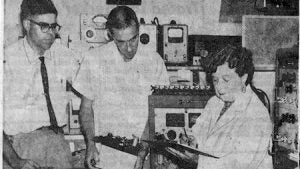 Marie Poland Fish - “Fish launched sound-collecting expeditions in an era when some institutions still banned women from ocean voyages.” Marie Poland Fish found the field of marine bioacoustics and, with her husband Charles, established a marine lab at URI, which would become GSO.
Marie Poland Fish - “Fish launched sound-collecting expeditions in an era when some institutions still banned women from ocean voyages.” Marie Poland Fish found the field of marine bioacoustics and, with her husband Charles, established a marine lab at URI, which would become GSO. 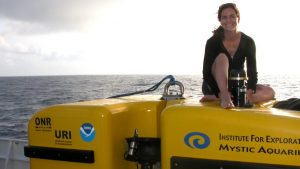 Catalina Martinez (alum) - “I get to help that next generation get to the point where they can then position themselves to be the wave of change that’s going to happen, to really broaden diversity in the sciences." Meet alum Catalina Martinez (M.S. 1999), the Regional Program Manager at the NOAA Office of Ocean Exploration and Research.
Catalina Martinez (alum) - “I get to help that next generation get to the point where they can then position themselves to be the wave of change that’s going to happen, to really broaden diversity in the sciences." Meet alum Catalina Martinez (M.S. 1999), the Regional Program Manager at the NOAA Office of Ocean Exploration and Research.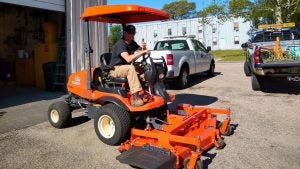 Seth Pilotte (staff) - "I really do enjoy helping people and trying to make URI a better place for everyone." Meet Seth Pilotte, URI Narragansett Bay Campus facilities coordinator, and one of the many dedicated staff members who’ve kept GSO running during the COVID-19 pandemic.
Seth Pilotte (staff) - "I really do enjoy helping people and trying to make URI a better place for everyone." Meet Seth Pilotte, URI Narragansett Bay Campus facilities coordinator, and one of the many dedicated staff members who’ve kept GSO running during the COVID-19 pandemic.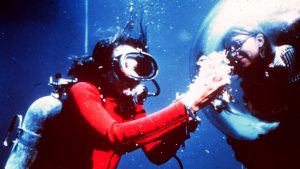 Alina Szmant (alum) - "The role of women in undersea research was going to depend an awful lot on how well we did." In 1970, GSO alum Alina Szmant (Ph.D. '80) was part of an all-female aquanaut team that lived & worked undersea for a NASA mission.
Alina Szmant (alum) - "The role of women in undersea research was going to depend an awful lot on how well we did." In 1970, GSO alum Alina Szmant (Ph.D. '80) was part of an all-female aquanaut team that lived & worked undersea for a NASA mission.
